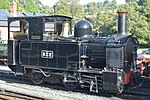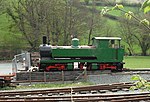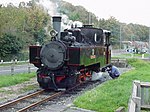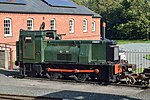Golfa Bank
| Welshpool & Llanfair Light Railway | |
|---|---|
| Rheilffordd y Trallwng a Llanfair Caereinion | |
 823 Countess – one of the two original W&LLR engines | |
| Locale | Mid-Wales |
| Terminus | Welshpool |
| Commercial operations | |
| Name | Welshpool & Llanfair Light Railway |
| Original gauge | 2 ft 6 in (762 mm) |
| Preserved operations | |
| Length | 8.5 miles (13.7 km) |
| Preserved gauge | 2 ft 6 in (762 mm) |
| Commercial history | |
| Opened | 1903 |
| Closed to passengers | 1931 |
| Closed | 1956 |
| Preservation history | |
| 1963 | Re-opened as a heritage railway |
| 1972 | Services extended to Sylfaen |
| 1981 | Opening of extension to Raven Square |
Welshpool & Llanfair Light Railway | ||||||||||||||||||||||||||||||||||||||||||||||||||||||||||||||||||||||||||||||||||||||||||||||||||
|---|---|---|---|---|---|---|---|---|---|---|---|---|---|---|---|---|---|---|---|---|---|---|---|---|---|---|---|---|---|---|---|---|---|---|---|---|---|---|---|---|---|---|---|---|---|---|---|---|---|---|---|---|---|---|---|---|---|---|---|---|---|---|---|---|---|---|---|---|---|---|---|---|---|---|---|---|---|---|---|---|---|---|---|---|---|---|---|---|---|---|---|---|---|---|---|---|---|---|
| ||||||||||||||||||||||||||||||||||||||||||||||||||||||||||||||||||||||||||||||||||||||||||||||||||
The Welshpool and Llanfair Light Railway (W&LLR) (Welsh: Rheilffordd y Trallwng a Llanfair Caereinion) is a 2 ft 6 in (762 mm) narrow gauge heritage railway in Powys, Wales. The line is around 8.5 miles (13.7 km) long and runs westwards from the town of Welshpool (Welsh: Y Trallwng) via Castle Caereinion to the village of Llanfair Caereinion.
History
Early proposals
| Welshpool and Llanfair Railway Act 1877 | |
|---|---|
| Act of Parliament | |
 | |
| Citation | 40 & 41 Vict. c. ccxxv |
| Welshpool and Llanfair Railway (Abandonment) Act 1882 | |
|---|---|
| Act of Parliament | |
 | |
| Citation | 45 & 46 Vict. c. xli |
| Other legislation | |
| Repealed by | Statute Law (Repeals) Act 2013 |
Status: Repealed | |
| Welshpool and Llanfair Railway Act 1887 | |
|---|---|
| Act of Parliament | |
 | |
| Citation | 50 & 51 Vict. c. clxxxv |
| Other legislation | |
| Repealed by | Welshpool and Llanfair Railway (Abandonment) Act 1892 |
Status: Repealed | |
| Welshpool and Llanfair Railway (Abandonment) Act 1892 | |
|---|---|
| Act of Parliament | |
 | |
| Long title | An Act for the abandonment of the Welshpool and Llanfair Railway. |
| Citation | 55 & 56 Vict. c. ii |
| Dates | |
| Royal assent | 20 May 1892 |
| Other legislation | |
| Repealed by | Statute Law (Repeals) Act 2013 |
Status: Repealed | |
| Text of statute as originally enacted | |
The first proposal to connect Llanfair Caerinion and Welshpool by railway was the Llanfair Railway of 1864; this would have been a narrow gauge line, with a mixed gauge section where it connected to the Cambrian Railways. This proposal was abandoned. The next attempt came in 1876 with the promotion of the Welshpool and Llanfair Railway Bill, which proposed a railway along a similar route to the 1864 effort. This bill passed through the Houses of Parliament, becoming the Welshpool and Llanfair Railway Act 1877 (40 & 41 Vict. c. ccxxv). This attempt failed because the promoters were unable to raise sufficient capital, and was officially abandoned by the Welshpool and Llanfair Railway (Abandonment) Act 1882 (45 & 46 Vict. c. xli). In 1886, another Welshpool and Llanfair Railway Bill appeared for a 3 ft (914 mm) gauge railway on a similar route; this became the Welshpool and Llanfair Railway Act 1887 (50 & 51 Vict. c. clxxxv) which expired unused in 1892, and was officially abandoned by the Welshpool and Llanfair Railway (Abandonment) Act 1892 (55 & 56 Vict. c. ii).[1]
The Light Railways Act 1896
In August 1896, the Light Railways Act 1896 (59 & 60 Vict. c. 48) was passed, and this spurred further attempts at a railway to Llanfair Caereinion. The first of these was the Llanfair & Meifod Valley Light Railway Bill of 1896, which proposed a standard-gauge line from Arddleen about 8 miles north of Welshpool, through the Meifod Valley.[1]
In late December 1896, the mayor of Welshpool William Addie proposed a 2 ft 6 in (762 mm) gauge railway called the Welshpool and Llanfair Light Railway. By March 1897, Addie had contracted with noted narrow gauge promoter Everard Calthrop to assist in preparing a case for the inquiry. An application for a Light Railway Order was submitted to the Board of Trade in May 1897. Calthrop proposed the use of transporter wagons, 0-6-0 tank locomotives and a large "Barsi-type" locomotive for heavy market day traffic. At the August 1897 public inquiry Calthrop appeared, along with J. R. Dix manager of the Corris Railway. The enquiry considered both the Llanfair & Meifod Light Railway and the Welshpool and Llanfair Light Railway proposals. The commissioners took their time deciding. Meanwhile, the promoters of the W&LLR had approached the Cambrian Railways to have them pay for and construct the railway. After much time-consuming negotiations, the Cambrian agreed and on 8 September 1899, the Welshpool and Llanfair Light Railway Order 1899 was granted to begin construction of the line.[1]
Original operations

It was opened on 6 April 1903 to aid economic development in a remote area, never making a profit. It was originally operated by the Cambrian Railways, connecting with it at the former Oswestry and Newtown Railway station in the town of Welshpool. The line is built through difficult country, having a great number of curves in order to reach the summit of 600 ft. The original terminus at Welshpool was located alongside the main line station and trains wound their way through the town, using the locomotive bell as a warning.[2][3]
In the 1923 Grouping of railway companies, Cambrian Railways, including the Welshpool to Llanfair Caereinion line, was absorbed by the Great Western Railway (GWR). On 9 February 1931 the line lost its passenger service, which was replaced by a bus service, and it became a freight-only line. It was temporarily re-opened to passengers between 6 and 11 August 1945 for the Eisteddfod. The GWR itself was nationalised in 1948 and became part of British Railways.
Freight traffic lingered on until 1956, by which time British Railways decided to close the line, with services ceasing on 5 November.[4]
Preservation


A group of volunteers and enthusiasts took the line over and started raising money to restore it. On 6 April 1963, the western half of the line, from Llanfair Caereinion to Castle Caereinion, was reopened as a Heritage railway.
On 13 December 1964, a pier supporting the steel girder bridge over the River Banwy was seriously damaged by flood waters dislodging the bridge. During the spring and early summer of 1965 the 16th Railway Regiment of the Royal Engineers replaced the damaged masonry pier with a fabricated steel one and restored the span to its original position. Train services between Llanfair Caereinion to Castle Caereinion resumed on 14 August 1965.[6]
In 1972, services were extended to Sylfaen. The line through Welshpool, however, could not be reopened, so the line now has a new terminus station at Raven Square on the western outskirts of the town, opened on 18 July 1981. In 2008, there were discussions with Welshpool Town Council about reinstating the link through the town to the main line station, following a different route from that originally used.[7]
Because of the 2 ft 6 in (762 mm) gauge, unusual for British narrow gauge railways, locomotives and rolling stock to supplement the originals have had to be obtained from sources around the world including the Zillertalbahn in Austria. A major grant from the Heritage Lottery Fund permitted restoration of both original locomotives together with several coaches and original wagons, and provision of new workshop facilities, ready for the line's centenary.
Golfa Bank
Golfa Bank is a particularly steep bank on the railway.[8] The bank is nearly a mile at 1 in 29, which in its day, was the steepest section of the Cambrian Railways worked by passenger trains and is still a challenging climb. The line travelling up the slope is curvy, to make the climb easier. Golfa summit is 630 ft above sea level, meaning the locomotives have to travel from about 350 ft above sea level at the bottom of Golfa Bank, equal to climbing 280 ft in 1.5 miles. The locomotives had to be built specifically to manage the bank, due to its steepness.
There was a halt at the top called Golfa, 1.75 miles or 3.2 km from the Welshpool Raven Square terminus. The halt had a loop that was provided for goods traffic.[9] The station was opened on 6 April 1903.[10] and closed with the line in 1931. The station officially reopened on 18 July 1981,[10] but was closed again by 2015.
Locomotives
Locomotives of the preserved railway
| WLLR No. | Name | Image | Builder | Works No. | Date built | Date arrived | Wheels | Type | Status |
|---|---|---|---|---|---|---|---|---|---|
| 1 | The Earl | 
|
Beyer Peacock | 3496 | 1902 | 1902 | 0-6-0T | Steam | Operational |
| Original W&LLR locomotive. Overhauled at the Vale of Rheidol Railway between 2019 and 2021. Currently painted in a Great Western green livery. | |||||||||
| 2 | Countess | 
|
Beyer Peacock | 3497 | 1902 | 1902 | 0-6-0T | Steam | Withdrawn following expiry of boiler certificate 2021 |
| Original W&LLR locomotive | |||||||||
| 5 | Nutty | 
|
Sentinel | 7701 | 1929 | 1964 | 4wVBT | Steam | N/A |
| Previously from Fletton Brickworks. Owned by and returned to care of Narrow Gauge Railway Museum in 1971, returned to the WLLR in 2023 having been at the Leighton Buzzard Railway. | |||||||||
| 6 | Monarch | 
|
W. G. Bagnall | 3024 | 1953 | 1966 | 0-4-4-0T | Steam | On display |
| From the Sittingbourne and Kemsley Light Railway. Sold to the Ffestiniog Railway but re-purchased by W&LLR. | |||||||||
| 7 | Chattenden * | 
|
Drewry Car Co. | 2263 | 1947 | 1968 | 0-6-0DM | Diesel | Operational |
| ex-Chattenden and Upnor Railway (also known as the Lodge Hill & Upnor Railway), previously from Admiralty Depots, rebuilt at Llanfair in 1980. Has recently been rebuilt at Llanfair and is now fitted with both air and vacuum braking. | |||||||||
| 8 | Dougal * | 
|
Andrew Barclay | 2207 | 1946 | 1968 | 0-4-0T | Steam | On display |
| Originally operated at Provan Gasworks, Glasgow. Currently awaiting boiler repairs | |||||||||
| 10 | Sir Drefaldwyn * | 
|
Franco-Belge | 2855 | 1944 | 1969 | 0-8-0T | Steam | Operational |
| Originally operated by the German Army as a tender engine. Then in Austria at the Salzkammergut-Lokalbahn as Number 19, then sold to the Steiermärkische Landesbahn as Number "699.01", where it was converted to a tank engine.[11] An HF 160 D-type locomotive. | |||||||||
| 11 | Ferret * | 
|
Hunslet Engine Company | 2251 | 1940 | 1971 | 0-4-0DM | Diesel | Operational |
| Previously from Admiralty armament depot in Wiltshire. Initially named Raven after the loco it replaced.[11] Returned to service in 2015 and is used primarily as a works shunter at Llanfair. | |||||||||
| 12 | Joan | 
|
Kerr Stuart | 4404 | 1929 | 1971 | 0-6-2T | Steam | On display |
| Originally operated in Antigua. Returned to service in 2011 with a new boiler. Out of service from 2020 following expiry of 10 year boiler ticket. | |||||||||
| 14 | SLR No. 85 | 
|
Hunslet Engine Company | 3815 | 1954 | 1975 | 2-6-2T | Steam | On display |
| Originally operated by Sierra Leone Government Railway. | |||||||||
| 16 | Scooby * | Hunslet Engine Company | 2400 | 1941 | 1992 | 0-4-0DM | Diesel | Stored | |
| Previously from Admiralty Depots. Rebuilt by W&LLR | |||||||||
| 17 | TSC 175 | 
|
Diema | 4270 | 1979 | 2004 | 6wDH | Diesel | Operational |
| Originally operated by Taiwan Sugar Company | |||||||||
* = Name added by WLLR
Locomotives on hire
| No. | Name | Image | Builder | Works No. | Date built | Date arrived | Wheels | Type | Status |
|---|---|---|---|---|---|---|---|---|---|
| 21 | Zillertal | 
|
Lokomotivfabrik Krauss & Co. | 4506 | 1900 | 2019 | 0-6-2T | Steam | Operational |
| U Class, one of two locomotives built for the opening of the Zillertalbahn. Arrived in August 2019 on hire from the Zillertalbahn for approximately two years.[12] | |||||||||
Former locomotives
| WLLR No. | Name | Image | Builder | Works No. | Date built | Date arrived | Wheels | Type | Status |
|---|---|---|---|---|---|---|---|---|---|
| 3 | Raven * | Ruston & Hornsby | 1934 | 4wDM | Diesel | N/A | |||
| Sold in 1974. Now in private ownership. | |||||||||
| 4 | Upnor Castle * | 
|
F. C. Hibberd | 3687 | 1954 | 1964 | 4wDM | Diesel | N/A |
| Sold to Ffestiniog Railway in 1968. | |||||||||
| 9 | Wynnstay * | 
|
J. Fowler | 1951 | 1969 | 0-6-0DM | Diesel | N/A | |
| Built for a failed groundnuts scheme in East Africa. In 1954 sold to British Portland Cement Co.'s works at Lower Penarth, Glamorgan. Arrived at Llanfair in 1969, Sold to the Great Whipsnade Railway in 1972 as Victor. | |||||||||
| 15 | Orion * | 
|
Tubize | 2369 | 1948 | 1983 | 2-6-2T | Steam | N/A |
| Previously from Finland. Returned to Jokioinen Museum Railway in Finland in 2006. | |||||||||
| 18 | 764.423 | Reșița Works | 1957 | 2004 | 0-8-0T | Steam | N/A | ||
| Originally operated in Romania. Sold in May 2016 to an Austrian buyer as a spare parts donor for #19[13] | |||||||||
| 19 | 764.425 | 
|
Reșița Works | 1957 | 2007 | 0-8-0T | Steam | N/A | |
| Originally operated in Romania. Sold in May 2016 to an Austrian buyer[13] | |||||||||
* = Name added by WLLR
Passenger carriages
Carriages of the preserved railway
| WLLR No. | Other No. | Image | Builder | Type | Date built | Date arrived | Notes |
|---|---|---|---|---|---|---|---|
| B14 | 
|
Grazer Waggon | 4-wheel balcony | 1900 | 1968 | Built for and donated by Zillertalbahn | |
| B16 | 
|
Grazer Waggon | 4-wheel balcony | 1901 | 1968 | Built for and donated by Zillertalbahn | |
| B17 | 
|
Grazer Waggon | 4-wheel balcony | 1901 | 1968 | Built for and donated by Zillertalbahn | |
| C572 | B25 | Grazer Waggon | 4-wheel balcony | 1925 | 1968 | Built for Satzkammergut-Lokalbahn | |
| C569 | B24 | 
|
Grazer Waggon | 4-wheel balcony | 1925 | 2003 | Built for Satzkammergut Lokalbahn |
| B27 | 
|
Grazer Waggon | 4-wheel balcony | 1954 | 1975 | Built for Austrian State Railways | |
| 1066 | 1040 | GRC&W | Bogie third | 1961 | 1975 | Rebuilt in Romania, 2008 | |
| 1207 | 
|
GRC&W | Bogie first | 1961 | 1975 | Rebuilt in Romania, 2009 | |
| 418 | 
|
Hungarian State Rly | Bogie | 1958 | 1999 | Rebuilt with extended balcony 2018-19 | |
| 430 | 
|
Hungarian State Rly | Bogie | 1958 | 1999 | Rebuilt with extended balcony 2018-19 | |
| 6166 | Ffestiniog Railway | Bogie composite | 2004 | Replica of 1903 R.Y. Pickering original | |||
| 4154 | Ffestiniog Railway | Bogie third | 2007 | Replica of 1903 R.Y. Pickering original | |||
| B20 | 
|
S.C. Calea Ferata Ingusta SRL in Brad | 4-wheel balcony | 2006 | 2007 | Replica of Austrian Zillertalbahn carriage | |
| 6366 | Ffestiniog Railway | Bogie composite | 2010 | Replica of 1903 R.Y. Pickering original |
Coordinates
- Welshpool station: 52°39′35″N 3°09′36″W / 52.659729°N 3.160082°W
- Llanfair station: 52°39′07″N 3°19′20″W / 52.651978°N 3.322146°W
52°38′43″N 3°15′01″W / 52.645341°N 3.250236°W
See also
- British narrow gauge railways
- Great Little Trains of Wales
- Welshpool Seven Stars Halt railway station
References
- ^ a b c Johnson, Peter (2011). An Illustrated History of the Great Western Narrow Gauge. Oxford Publishing Co.
- ^ Farnworth, Roger (24 July 2022). "The Welshpool & Llanfair Light Railway – Part 1 – The Abandoned Town Section". Roger Farnworth. Retrieved 26 December 2022.
- ^ Farnworth, Roger (23 September 2022). "The Welshpool & Llanfair Light Railway – An Addendum". Roger Farnworth. Retrieved 26 December 2022.
- ^ Railway Magazine November 1956
- ^ "Workshop Week - Part 2". Fifteen Flatout. 21 February 2017. Retrieved 22 July 2017.
- ^ Gunston, Henry (July 1966). "Rebuilding the Banwy Bridge". Railway Magazine. Vol. 112, no. 783. pp. 408–409.
- ^ "Steam train could return to town". BBC News. 31 March 2008. Retrieved 12 July 2022.
- ^ "English". Coflein. Retrieved 16 June 2021.
- ^ Rushton, Page 24
- ^ a b Butt 1995, p. 106.
- ^ a b Welshpool & Llanfair Light Railway Guide. Welshpool & Llanfair Light Railway Preservation Company Ltd. 1973.
- ^ "Llanfair Line to host Austrian narrow gauge locomotive in UK". Welshpool & Llanfair Light Railway. Retrieved 12 September 2019.
- ^ a b "Handel mi Eisenbahnmaterial Georg Hocevar, Graz". Overseas News (978). Industrial Railway Society. p. 4. September 2016.
Bibliography
- Butt, R. V. J. (October 1995). The Directory of Railway Stations: details every public and private passenger station, halt, platform and stopping place, past and present (1st ed.). Sparkford: Patrick Stephens Ltd. ISBN 978-1-85260-508-7. OCLC 60251199. OL 11956311M.
- Cartwright, Ralph I. (2002). The Welshpool & Llanfair. RailRomances. ISBN 1-900622-06-8
- Edwards, Oliver (2023). Welshpool & Llanfair Light Railway Through the Years. Narrow Gauge Album No. 1. Chippenham, Wilts, UK: Mainline & Maritime. ISBN 9781900340632.
- Rushton, Gordon (2015). The Welshpool & Llanfair Railway Travellers's Guide. Llanfair Caereinion : Welshpool & Llanfair Railway.
- The Welshpool & Llanfair Light Railway (2021). The Welshpool & Llanfair Light Railway Traveller's Guide. The Welshpool & Llanfair Light Railway.
